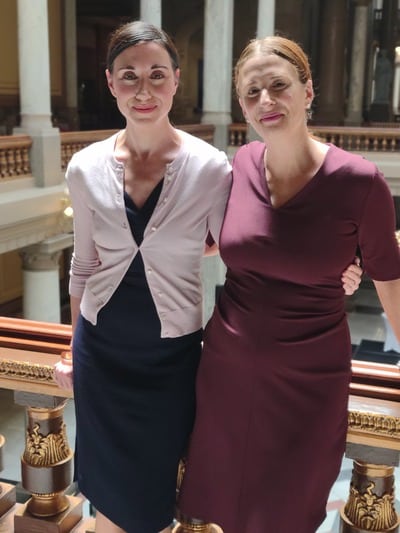
By Marilyn Odendahl
The Indiana Citizen
June 21, 2024
To mark the two-year anniversary of the U.S. Supreme Court decision that overturned women’s right to abortion, Women 4 Change Indiana wants Hoosier women to go on strike on Monday – no work, no school and no spending money.
Women’s March, a national organization, is promoting the June 24th strike nationwide to show how much women contribute to the American economy and societal well-being. Women 4 Change has not planned any public rally or march to highlight the protest, but rather wants women to share their stories through social media of what professional and familial demands they did not fulfill while on strike or, if they could not take the day off, all the tasks they would not have done.
“This society runs on women,” Angela Klitzsch, CEO of Women 4 Change Indiana, said. “When we en masse stand up, I believe that we’ll be able to really demonstrate that, but for us, (the United States) will not be growing as an economy and we won’t have the essential services, that were highlighted so often during COVID, happening as well.”
Women 4 Change Indiana is a nonpartisan nonprofit that seeks better health, economic and personal safety outcomes for women. The organization conducts civic education programming and advocates in the legislature for policy change.
Although the strike is being held on the day the 2022 ruling in Dobbs v. Jackson Women’s Health Organization, which ended the constitutional right to an abortion, was handed down by the U.S. Supreme Court, Women 4 Change Indiana has a broader focus. The nonprofit devotes part of its effort to promoting voting but also educates on infant and maternal health, mental health, violence toward women, and economic stability.
However, Klitzsch said reproductive rights is the lynchpin.
“If women don’t have agency and ability to control their reproductive health, they’re not going to be able to participate in the workforce at the numbers that they are,” Klitzsch said. “So (June 24) is an important day for us to honor and the way that we’re going to do so is to really not participate.”

Losing bandwidth during COVID
Both Klitzsch and Aimee Robertson-West, vice president of development and communications for Women 4 Change Indiana, pointed to studies and statistics that show the economic muscle of women.
In particular, women’s spending and gains in the labor market are credited with fueling the growth of the national economy in 2023, according to a report from the Center for American Progress. The power will continue as women are expected to drive two-thirds of discretionary spending by 2028. In the labor market, women ages 25 to 54 are boasting a record employment rate of 75.3%.
Even so, women still encounter hurdles and barriers in the workplace. Stats from the U.S. Census Bureau show women have more education than their male counterparts but earn 52% to 77% less than men. The health care and education sectors are especially inequitable with women holding 80% of all jobs in those two fields, but filling only 20% of the leadership roles, according to the U.S. Bureau of Labor Statistics.
Klitzsch said multiple factors are hindering women’s progress and stature, but the COVID-19 pandemic caused the most damage. During that time of isolation, women shouldered additional demands, including working from home, overseeing their children doing remote schooling and taking care of the household.
“I, personally, believe, particularly during COVID, that the bandwidth of women was really reduced,” Klitzsch said. “We were doing as much as we could, in many instances, to maintain our families, to meet our professional and personal demands, and while that was happening, we weren’t participating as fully in our democracy and our voices are not being heard by those who are in elected office currently.”
Amplifying stories on social media
The strike provides the opportunity for women to flex their social and economic muscles. Robertson-West said women are being asked to not participate for one day and tabulate what happens when they check out of their jobs, their homes and their communities.
However, Klitzsch and Robertson-West acknowledged that not every woman can strike. Some could lose their jobs if they do not show up for work. So Women 4 Change Indiana is asking all women, whether they actually check out or not, to document all that they do and all that would not get done at work and at home if they did strike. Also, they should look at their buying power and note what items or services would not be purchased if they did not spend money on Monday.
Klitzsch and Robertson-West want women to post their stories on their social media feeds and then amplify those stories by sharing them on the Women 4 Change Indiana Facebook, Instagram and X (formerly Twitter) platforms with the hashtag #w4cwomenstrikein2024.
“For this particular day, we think it’s appropriate to talk about what would happen if we just stopped doing everything for everyone,” Robertson-West said.
Klitzsch acknowledged Hoosier women will have difficulty not working and not spending because of the responsibilities many carry, most importantly caring for their children. However, holding a one-day strike, she said, could jolt employers and lawmakers and open their eyes to the contribution and economic impact women provide.
Still, Klitzsch and Robertson-West said a single strike will not cure all ills. They pointed out that more women registered to vote in Indiana in 2022 and 2023, and more women ran for elective office in the last election than ever before in the state, but, they said, many still vote for people who are passing policies that are harmful to women.
The strike is one step and more are to follow, Klitzsch said. Women 4 Change Indiana is currently planning a lot of programming related to civic education and voting to help inform voters in advance of the November election, she said.
“This is a long-term game,” Klitzsch said. “We’ve seen an erosion of women’s rights over the last few years, and so we need to come back to reclaim our rights and create positive, innovative solutions that are going to support women and families.”
Dwight Adams, a freelance editor and writer based in Indianapolis, edited this article. He is a former content editor, copy editor and digital producer at The Indianapolis Star and IndyStar.com, and worked as a planner for other newspapers, including the Louisville Courier Journal.
The Indiana Citizen is a nonpartisan, nonprofit platform dedicated to increasing the number of informed and engaged Hoosier citizens. We are operated by the Indiana Citizen Education Foundation, Inc., a 501(c)(3) public charity. For questions about the story, contact Marilyn Odendahl at marilyn.odendahl@indianacitizen.org